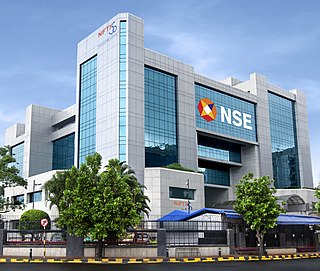Related Research Articles
A hedge fund is a pooled investment fund that trades in relatively liquid assets and is able to make extensive use of more complex trading, portfolio-construction, and risk management techniques in an attempt to improve performance, such as short selling, leverage, and derivatives. Financial regulators generally restrict hedge fund marketing to institutional investors, high net worth individuals, and accredited investors.

A capital market is a financial market in which long-term debt or equity-backed securities are bought and sold, in contrast to a money market where short-term debt is bought and sold. Capital markets channel the wealth of savers to those who can put it to long-term productive use, such as companies or governments making long-term investments. Financial regulators like Securities and Exchange Board of India (SEBI), Bank of England (BoE) and the U.S. Securities and Exchange Commission (SEC) oversee capital markets to protect investors against fraud, among other duties.

A security is a tradable financial asset. The term commonly refers to any form of financial instrument, but its legal definition varies by jurisdiction. In some countries and languages people commonly use the term "security" to refer to any form of financial instrument, even though the underlying legal and regulatory regime may not have such a broad definition. In some jurisdictions the term specifically excludes financial instruments other than equities and fixed income instruments. In some jurisdictions it includes some instruments that are close to equities and fixed income, e.g., equity warrants.
In the field of finance, the term private equity (PE) refers to investment funds, usually limited partnerships, which invest in and restructure private companies. A private-equity fund is both a type of ownership of assets and is a class of assets, which function as modes of financial management for operating private companies that are not publicly traded in a stock exchange.
A mutual fund is an investment fund that pools money from many investors to purchase securities. The term is typically used in the United States, Canada, and India, while similar structures across the globe include the SICAV in Europe and open-ended investment company (OEIC) in the UK.

The Securities and Exchange Board of India (SEBI) is the regulatory body for securities and commodity market in India under the ownership of Ministry of Finance within the Government of India. It was established on 12 April 1988 as an executive body and was given statutory powers on 30 January 1992 through the SEBI Act, 1992.

National Stock Exchange of India Limited (NSE) is one of the leading stock exchanges in India, based in Mumbai. NSE is under the ownership of various financial institutions such as banks and insurance companies. It is the world's largest derivatives exchange by number of contracts traded and the third largest in cash equities by number of trades for the calendar year 2022. It is one of the largest stock exchanges in the world by market capitalization. NSE's flagship index, the NIFTY 50, a 50 stock index is used extensively by investors in India and around the world as a barometer of the Indian capital market. The NIFTY 50 index was launched in 1996 by NSE.
A joint venture (JV) is a business entity created by two or more parties, generally characterized by shared ownership, shared returns and risks, and shared governance. Companies typically pursue joint ventures for one of four reasons: to access a new market, particularly Emerging market; to gain scale efficiencies by combining assets and operations; to share risk for major investments or projects; or to access skills and capabilities.
An institutional investor is an entity which pools money to purchase securities, real property, and other investment assets or originate loans. Institutional investors include commercial banks, central banks, credit unions, government-linked companies, insurers, pension funds, sovereign wealth funds, charities, hedge funds, REITs, investment advisors, endowments, and mutual funds. Operating companies which invest excess capital in these types of assets may also be included in the term. Activist institutional investors may also influence corporate governance by exercising voting rights in their investments. In 2019, the world's top 500 asset managers collectively managed $104.4 trillion in Assets under Management (AuM).
A private equity fund is a collective investment scheme used for making investments in various equity securities according to one of the investment strategies associated with private equity. Private equity funds are typically limited partnerships with a fixed term of 10 years. At inception, institutional investors make an unfunded commitment to the limited partnership, which is then drawn over the term of the fund. From the investors' point of view, funds can be traditional or asymmetric.

A financial adviser or financial advisor is a professional who provides financial services to clients based on their financial situation. In many countries, financial advisors must complete specific training and be registered with a regulatory body in order to provide advice.
A participatory note, commonly known as a P-note or PN, is an instrument issued by a registered foreign institutional investor (FII) to an overseas investor who wishes to invest in Indian stock markets without registering themselves with the market regulator, the Securities and Exchange Board of India (SEBI).

An alternative investment, also known as an alternative asset or alternative investment fund (AIF), is an investment in any asset class excluding stocks, bonds, and cash. The term is a relatively loose one and includes tangible assets such as precious metals, collectibles and some financial assets such as real estate, commodities, private equity, distressed securities, hedge funds, exchange funds, carbon credits, venture capital, film production, financial derivatives, cryptocurrencies, non-fungible tokens, and Tax Receivable Agreements. Investments in real estate, forestry and shipping are also often termed "alternative" despite the ancient use of such real assets to enhance and preserve wealth. Alternative investments are to be contrasted with traditional investments.
Qualified institutional placement (QIP) is a capital-raising tool, primarily used in India and other parts of southern Asia, whereby a listed company can issue equity shares, fully and partly convertible debentures, or any securities other than warrants which are convertible to equity shares to a qualified institutional buyer (QIB).
A non-banking financial institution (NBFI) or non-bank financial company (NBFC) is a financial institution that does not have a full banking license or is not supervised by a national or international banking regulatory agency. NBFC facilitate bank-related financial services, such as investment, risk pooling, contractual savings, and market brokering. Examples of these include insurance firms, pawn shops, cashier's check issuers, check cashing locations, payday lending, currency exchanges, and microloan organizations. Alan Greenspan has identified the role of NBFIs in strengthening an economy, as they provide "multiple alternatives to transform an economy's savings into capital investment which act as backup facilities should the primary form of intermediation fail."
Indian Depository Receipt (IDR) is a financial instrument denominated in Indian Rupees in the form of a depository receipt. The IDR is a specific Indian version of the similar global depository receipts.

Securities Laws (Amendment) Act, 2014 is a legislation in India which provided the securities market regulator Securities and Exchange Board of India (SEBI) with new powers to effectively pursue fraudulent investment schemes, especially ponzi schemes. The bill also provides guidelines for the formation of special fast trial courts.
Securities and Exchange Board Of India Regulations, 1996 is a set of regulations in India that govern mutual funds. It is enforced by the Securities and Exchange Board of India (SEBI). The regulations have been primarily designed to protect the investors. This replace an older set of regulations from 1993. SEBI had been regulating the mutual fund market since 1991.

Qualifying Investor Alternative Investment Fund or QIAIF is a Central Bank of Ireland regulatory classification established in 2013 for Ireland's five tax-free legal structures for holding assets. The Irish Collective Asset-management Vehicle or ICAV is the most popular of the five Irish QIAIF structures, it is the main tax-free structure for foreign investors holding Irish assets.
Financial regulation in India is governed by a number of regulatory bodies. Financial regulation is a form of regulation or supervision, which subjects financial institutions to certain requirements, restrictions and guidelines, aiming to maintain the stability and integrity of the financial system. This may be handled by either a government or non-government organization. Financial regulation has also influenced the structure of banking sectors by increasing the variety of financial products available. Financial regulation forms one of three legal categories which constitutes the content of financial law, the other two being market practices and case law.
References
- 1 2 3 4 5 6 "SEBI permits 123 alternative investment funds to operate in India". The Hindu Business Line . 1 December 2014. Retrieved 17 April 2015.
- 1 2 3 Pratap Giri S. Investment Banking. Tata McGraw-Hill Education. p. 233. ISBN 978-1-259-05872-1 . Retrieved 17 April 2015.
- ↑ "De-jargoned: Alternative investment funds". Live Mint . 4 March 2015. Retrieved 17 April 2015.
- ↑ "Govt to allow FDI in alternative investment funds". The Hindu Business Line . 28 February 2015. Retrieved 17 April 2015.